In response to:
Fulbright: The Timid Opposition from the January 26, 1967 issue
To the Editors:
With a rare and enviable candor, I. F. Stone [NYR, Dec. 26, Jan. 12, Jan. 26] has revealed to us the secret world of the reviewer. It is a Utopia, where the skies are azure, the winds soft, and senators always vote “right.” Any who violate this world are immediately declared fiends and driven out, and are then fair play for reviewers. The reviewer has been created as a monitor.
This is not the world of Washington as I know it. Instead, courage is so rare and so evanescent here that to catch even one glimpse of it a year is an exciting and thrilling event. In his summer of dissent, Senator J. William Fulbright provided this courage. The conservative and respectable chairman of the Foreign Relations Committee defied the most powerful and vindictive President in our history, and, what is worse, told the truth about the Dominican Republic and Vietnam. He did something more. He suggested, for the Senator is hardly ever dogmatic, that President Johnson was emotionally incapable of bringing about a peace in Vietnam.
Tremendous pressure was brought on Senator Fulbright to silence him. Washington is quite like Communist China in its brain-washing techniques. Every one belongs to a group or set in Washington, and those who fail to conform are “alienated,” and made to feel their thoughts are strange and insane. Columnists demanded that Fulbright resign his chairmanship, others reviled him. A high Administration official castigated him at a social gathering. The President heaped scorn on him at a banquet of the faithful. The White House openly courted Governor Orval Faubus to run against Fulbright in 1968. Many of his colleagues joined the chase. Even those who agreed with him, with a few exceptions, were silent. A goodly score of those whom Mr. Stone so admires for voting “right” on civil rights and Dixon-Yates played it safe.
The effect of Senator Fulbright’s lonely dissent was to create a respectability for probing questions about American war and foreign policy. In our conformist society, this is highly essential for change. No one knows this so well as Lyndon Johnson, and this accounts for his rage at Senator Fulbright.
The Fulbright whom Mr. Stone has driven from his Utopia so ferociously is like the ogre in the nursery rhyme. My impression is that Mr. Stone believes he planned the Brinks robbery and selected the targets in Vietnam personally.
Tristam Coffin
Chevy Chase, Maryland
This Issue
March 9, 1967


